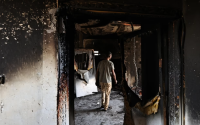December 3, 2002by Gary Leupp
Poor General Nizar al-Khazraji. Just when his prospects seemed so promising, he finds himself under house arrest in his suburban Copenhagen apartment, victim of a zealous public prosecutor of international crimes named Birgitte Vestberg----and perhaps others who find him not so much loathsome as merely inconvenient. The London Times (November 20) reports "dismay" in Washington and London over Ms. Vestberg's action; but I wonder if it doesn't actually produce smug satisfaction in some Washington quarters.
Gen. Khazraji (64) is Saddam Hussein's former chief of staff. He commanded the Iraqi Army during the Iran-Iraq War from 1980 to 1988, and served as a military advisor during the 1990 invasion of Kuwait (which he says he opposed). He organized defenses against a possible U.S. invasion at the end of the Persian Gulf War. According to his account, he fled to Jordan in 1996 at the invitation of CIA-backed exiles connected with the Iraqi National Accord, one of the INC's rival organizations, but told them that he "had left Iraq to work for the Iraqi army and people and not to be part of any movement outside the country."
Khazraji lived in Spain, and then since 1999 in Denmark. In that year, Frank Ricciardone, Clinton State Department's "coordinator for an Iraqi transition," contacted his through third parties to discuss his possible role in the overthrow of Saddam's regime (UPI, December 19, 2001). While maintaining contact with U.S. officials, Khazraji sought asylum in Denmark while confronting accusations from human rights groups assailing his military record. Specifically, he has been accused of responsibility for the use of nerve and mustard gas against Kurdish civilians in Iraq, as well as Iranian soldiers; 5,000 Kurds in the town of Halabja in March 1988 were probably gassed to death by his orders. The Washington Post (November 20) notes, "He [has been] formally accused of murder, pillage and wanton destruction of property in violation of the Geneva Conventions."
But never mind all that (yet). The point of interest is that for many months now Khazraji has been one of two prominent Iraqi exiles championed by different factions in the Bush administration to serve as its post-Saddam satrap in Baghdad, the other being the civilian leader of the Iraqi National Congress (INC), Ahmad Chalabi, formerly a professor of mathematics and founder of a successful London software company. (The INC was established by the CIA after the Gulf War as the embryo of a future Baghdad regime, and has been funded by Congress since 1998.) Counter-intuitive though it may seem, Khazraji has been backed for over a year by "moderate" Colin Powell's State Department and the CIA, while the Defense Department and Pentagon have favored Chalabi. (Former CIA head James Woolsey speaks well of Chalabi, but currently he commands little respect within the Agency. The most recent U.S. News & World Report indicates that it sees him as "self-serving and unreliable," adding that a "State Department official derides [the INC] as the 'Mercedes-Benz-riding, fine-hotel-staying opposition.'" It doesn't help that in the early '90s Chalabi was convicted of money-laundering in Jordan, and more recently, according to the BBC, was unable to account for four million dollars in U.S. aid to the INC.)
So (just thinking aloud here) I wonder if maybe Khazraji's fate in Denmark, a NATO country fully on board the "war on terrorism" (if ambivalent about war on Iraq), may have something to do with the infighting between these two U.S. government factions. According to the London-based Arabic-language newspaper Al-Hayat (February 11), Khazraji was "the favored candidate" in Washington at that time to be cultivated as post-Saddam Iraqi leader. (Around that time a German interviewer asked him, "Are you, as an Iraqi, seriously calling upon U.S. bomb attacks on your country?" and Khazraji replied, "By God, I think yes. The time is ripe." See National Review Online, February 18.)
Seymour Hersh interviewed CIA officials who told him that Khazraji was their "brightest prospect" (New Yorker, March 11). AP on March 13 reported "one potential military leader being touted in Iraqi-opposition circles is Gen. Nizar Khazraji, a former chief of staff and a hero of the 1980-88 Iraq-Iran war who is now seeking asylum in Denmark." Anthony Shabib reported that the "two generals that have drawn the most interest from the State Department are Najib al-Salhi, a former Republican Guard commander now in Washington, and Nizar Khazraji, a former Iraqi chief of staff in exile in Denmark. 'We've stepped up our contacts, and we've heard some interesting ideas,' a State Department official said" (Boston Globe, March 16). David Mack, a senior official at the State Department, declared that Khazraji "enjoys a good military reputation" and has "the right ingredients" to be future leader in Iraq. (Among such "ingredients" is his known preference for a military government.) As for the war crimes, the State Department concurred with the view of certain leaders of the Washington contingent of the "Patriotic Union of Kurdistan" which, despite Halabja, has supported the general. "We don't want to take any action against the defected military people who worked in the Iraqi army," they aver, "because if you do, it will help Saddam Hussein" (UPI, December 19, 2001). Khazraji looked like a shoo-in for the Baghdad job.
But something was afoot in the pro-Chalabi camp. According to Hersh's March article:
Chalabi and his allies [emph. added] have, in recent months, endorsed what amounts to a public-relations campaign against Khazraji, alleging that he was involved in a war crime-the 1988 Iraqi gassing of a Kurdish town, a claim Khazraji denies-and suggesting that he may be a double agent. 'There's a huge firestorm over Chalabi that's preventing us from reaching out to the Iraqi military,' a former C.I.A. operative told me. 'It's mind-boggling for an outsider to understand the impasse.'
In other words, the CIA "outsider" found it frustrating that the prospects of his man Khazraji were being hobbled by all this fuss about his war crimes, raised by Chalabi, the INC and their Washington friends. But not so mind-boggling if seen in the context of the ongoing struggle between Powell and his rivals. According to Hersh, Vice President Cheney, Deputy Secretary of Defense Paul Wolfowitz and Bush advisor Richard Perle are all among this camp of Chalabi friends (see also Max Singer in National Review, June 20). Surely they backed the anti-Khazraji public-relations campaign (and perhaps placed some calls to Copenhagen). I doubt very much whether squeamishness about that mustard gas & all factors significantly in their position; maybe they think a longtime civilian CIA operative would be easier to manage and manipulate than a general with widespread links among the Iraqi officer corps, who may not be entirely appreciative of the U.S. "liberation" and occupation of their country. (A 101-page report prepared by Iraqi "opposition leaders" under U.S. sponsorship, recently presented to Condoleeza Rice, "calls for the Iraqi Army to have little to do with guaranteeing postwar security," since "most officers are compromised by their ties to Hussein." and instead indicates that "U.S. troops and newly trained émigrés" should fill that role. See Boston Globe, November 27.)
So once again, it's been Powell vs. the chickenhawks, and the latter have won out, for better or worse, dooming war criminal Gen. Khazraji's aspirations to Karzai-like greatness.
* * *
But perhaps the question of Iraqi leadership has become irrelevant. U.S. government officials (who have apparently toyed with the idea of a Hashemite monarchy in Iraq, specifically, Prince Hassan, the uncle of the current Jordanian monarch, Abdullah II) now deny that they're even "going to be in the business of choosing" which Iraqi who should lead Iraq. Rather, White House sources presently describe a "postwar planbeginning with a period of military rule, most likely by an American general" (U.S. News, Dec. 2). The idea has been bandied about publicly (and then denied) since mid-October. But apparently this administration, initially very loath to undertake "state-building," has finally become so frustrated with the inadequacies and historical baggage of those whom it had earlier fingered as potential puppets, and the inability of the various Iraqi opposition forces to bury their differences to better execute U.S. objectives, that it must opt for the (highly risky) solution of outright occupation. A MacArthur, rather than a Karzai, must be officially at the helm.
But if there's a war, and a U.S. victory, I doubt it will actually make a whole lot of difference to the Iraqi people whether they're governed afterwards by General Tommy Franks (with Chalabi maybe in a supporting role) or a quisling General Khazraji or Salhi. Just as there's no difference, fundamentally, between Powell and Rumsfeld, the Tweedledy Dee and Twiddledy Dum of U.S. imperialism, as that system runs totally amuck.
Gary Leupp is an an associate professor, Department of History, Tufts University and coordinator, Asian Studies Program.He can be reached at: [email protected]http://www.counterpunch.org/leupp1203.html






